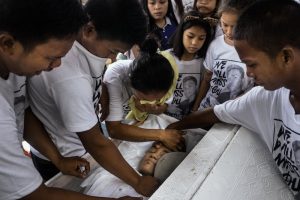
Igloria’s poem “Refuse Ghazal” discusses violence in a creative way. It begins with a woman pleading to cover up her husband’s corpse and the police refusing to let her. It then goes into her daughter refusing to be quiet after seeing her dead father. The only people who do not refuse anything are the witnesses. It makes one wonder if the witnesses saw anything and what did they see. Then it jumps to the end with the question of how many bodies will turn up on the side of the road, in a ditch or a dumpster. How many more people will die? Who is killing the people? Who are the masked men on the motorcycle? What is there motivation for targeting people? This poem told the story of Jhay Lorde Clemente, a citizen of the Philippines who was a father, son, and unfortunately a drug addict. He was also according to President Rodrigo Duterte, a criminal element that deserved to die. Clemente was not even considered a human in the eyes of Duterte because he was a drug addict. The president referred to people in his situations as inhuman. When asked if his war on drugs constitute crimes against humanity, he said, “Drug users were beyond rehabilitation and war cannot be waged without killings.” When Duterte came into to office: his State of the Union Address (SONA) threatened to abolish the Commission on Human Rights in the Philippines in order to wage war on drugs. Many corpses have turned up on the side of the rode, so today the police department in the Philippines are referring to the murders as DUI (Deaths Under Investigation) The narrative is that human rights can be violated when it comes to drug culture according to President Duterte. Dr. Igloria’s poem asks about the number of people turning up dead and Jhay Lord Clemente’s story then answers that question: according to the Philippines National Police, to his day 2, 128 people have been murdered in vigilante killings. Igloria’s also mentions two makes motorcyclists in “Refusal Ghazal” which can be a reference to the Duterte administration. There is also that underlying question of the motivation for the vigilante cleansing. In Clemente’s story it is the cleansing of drug abusers from a society, borderline ethnic cleansing more so cultural cleansing, and even better word for the motivation behind the violence is extrajudicial killing. Extrajudicial killing is murder, but it is often referred to as a pattern of deaths applied among a particular group of people. Although in this particular case, the poem is saying the same thing within context, the tone of voice is softer making it seem as though it is not bad as it seems. I do not believe there is a counter narrative in “Refuse Ghazal”. Dr. Igloria’s poems, “Before the hit, They Removed My Leash” and “Refuse Ghazal” the universal values are centered around historical human rights violations and how they are handled. What is being done to resolve the problem? They also focus on expressing the grief violation have caused. The voice of the resented condemns human rights violations regardless of the motivations behind them.